Bachelor of Food Science Opinion Editorial: Plastic in Human Food
VerifiedAdded on 2023/06/04
|5
|1050
|51
Essay
AI Summary
This opinion editorial, written by a food science student, addresses the ethical concerns of plastic in the human food chain, viewed through the framework of Catholic Social Teachings. The essay emphasizes the principles of human dignity and the common good, arguing that the production of plastic food violates these principles. The author, drawing from their future profession, proposes creating awareness among those involved in producing plastic food and educating future food scientists to base their decisions on ethical considerations. The essay highlights the harmful effects of plastic food and the need for stakeholders to uphold ethical standards, emphasizing that the principles of human dignity and the common good should guide actions in the food industry. The author references several scholarly articles to support their arguments, highlighting the importance of integrating ethical considerations into the field of food science.
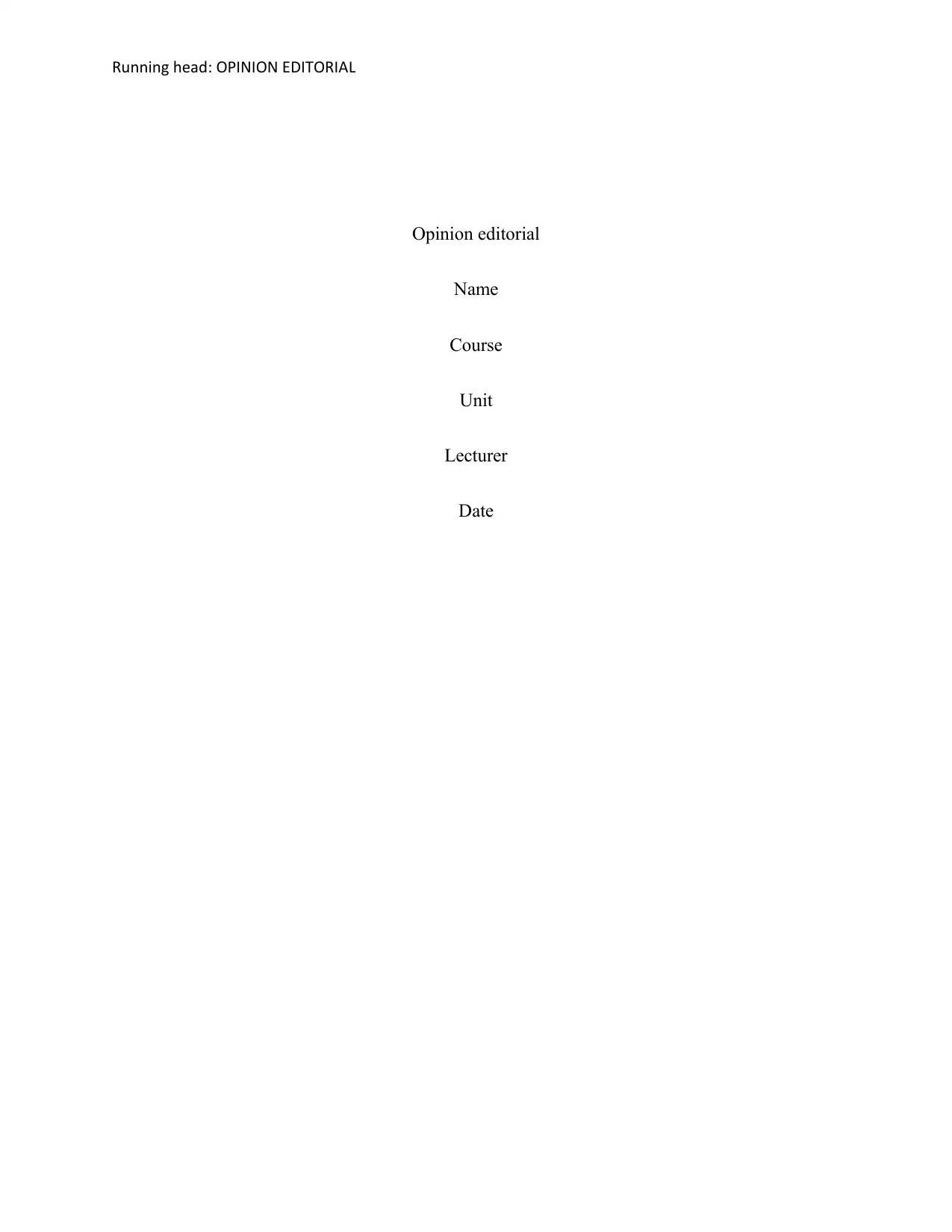
Running head: OPINION EDITORIAL
Opinion editorial
Name
Course
Unit
Lecturer
Date
Opinion editorial
Name
Course
Unit
Lecturer
Date
Paraphrase This Document
Need a fresh take? Get an instant paraphrase of this document with our AI Paraphraser
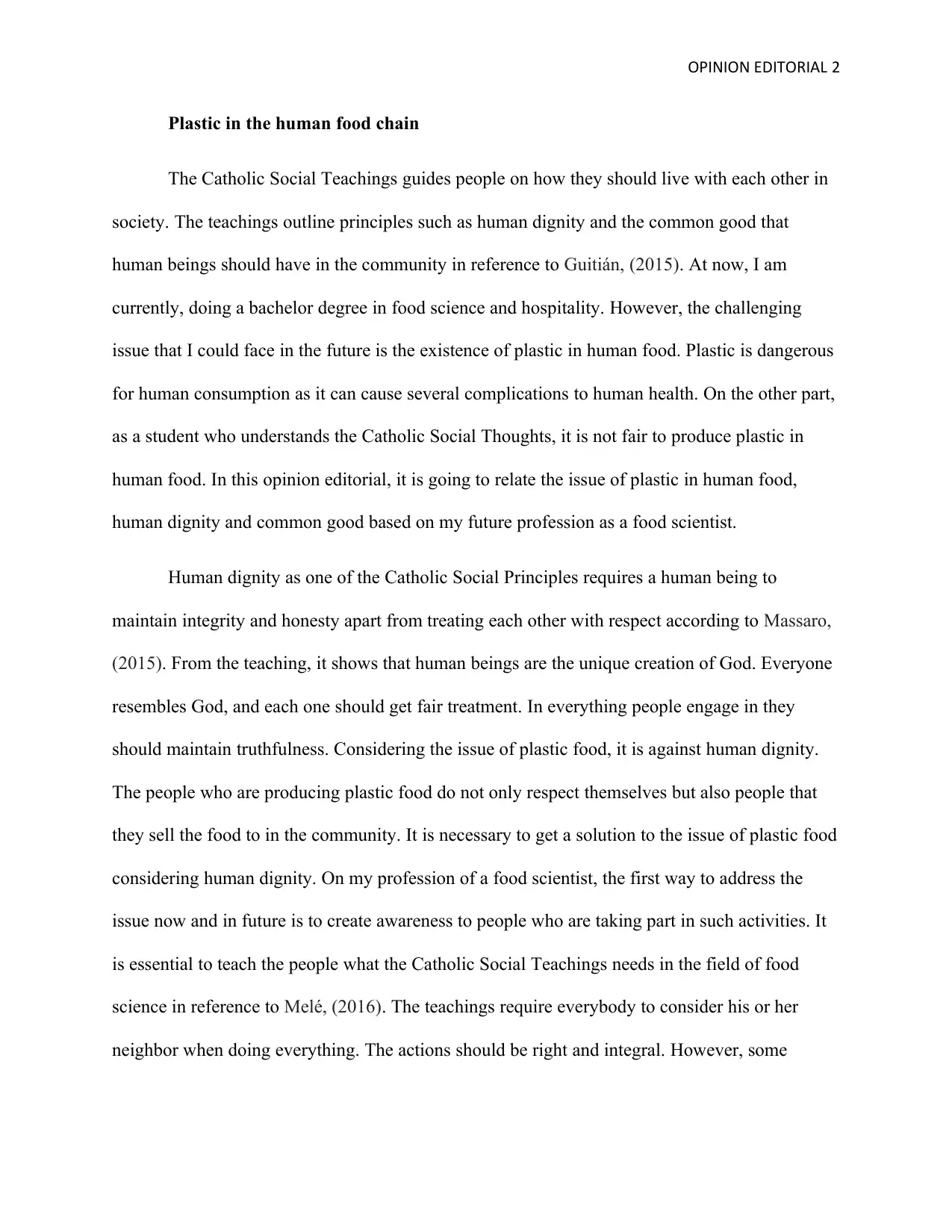
OPINION EDITORIAL 2
Plastic in the human food chain
The Catholic Social Teachings guides people on how they should live with each other in
society. The teachings outline principles such as human dignity and the common good that
human beings should have in the community in reference to Guitián, (2015). At now, I am
currently, doing a bachelor degree in food science and hospitality. However, the challenging
issue that I could face in the future is the existence of plastic in human food. Plastic is dangerous
for human consumption as it can cause several complications to human health. On the other part,
as a student who understands the Catholic Social Thoughts, it is not fair to produce plastic in
human food. In this opinion editorial, it is going to relate the issue of plastic in human food,
human dignity and common good based on my future profession as a food scientist.
Human dignity as one of the Catholic Social Principles requires a human being to
maintain integrity and honesty apart from treating each other with respect according to Massaro,
(2015). From the teaching, it shows that human beings are the unique creation of God. Everyone
resembles God, and each one should get fair treatment. In everything people engage in they
should maintain truthfulness. Considering the issue of plastic food, it is against human dignity.
The people who are producing plastic food do not only respect themselves but also people that
they sell the food to in the community. It is necessary to get a solution to the issue of plastic food
considering human dignity. On my profession of a food scientist, the first way to address the
issue now and in future is to create awareness to people who are taking part in such activities. It
is essential to teach the people what the Catholic Social Teachings needs in the field of food
science in reference to Melé, (2016). The teachings require everybody to consider his or her
neighbor when doing everything. The actions should be right and integral. However, some
Plastic in the human food chain
The Catholic Social Teachings guides people on how they should live with each other in
society. The teachings outline principles such as human dignity and the common good that
human beings should have in the community in reference to Guitián, (2015). At now, I am
currently, doing a bachelor degree in food science and hospitality. However, the challenging
issue that I could face in the future is the existence of plastic in human food. Plastic is dangerous
for human consumption as it can cause several complications to human health. On the other part,
as a student who understands the Catholic Social Thoughts, it is not fair to produce plastic in
human food. In this opinion editorial, it is going to relate the issue of plastic in human food,
human dignity and common good based on my future profession as a food scientist.
Human dignity as one of the Catholic Social Principles requires a human being to
maintain integrity and honesty apart from treating each other with respect according to Massaro,
(2015). From the teaching, it shows that human beings are the unique creation of God. Everyone
resembles God, and each one should get fair treatment. In everything people engage in they
should maintain truthfulness. Considering the issue of plastic food, it is against human dignity.
The people who are producing plastic food do not only respect themselves but also people that
they sell the food to in the community. It is necessary to get a solution to the issue of plastic food
considering human dignity. On my profession of a food scientist, the first way to address the
issue now and in future is to create awareness to people who are taking part in such activities. It
is essential to teach the people what the Catholic Social Teachings needs in the field of food
science in reference to Melé, (2016). The teachings require everybody to consider his or her
neighbor when doing everything. The actions should be right and integral. However, some
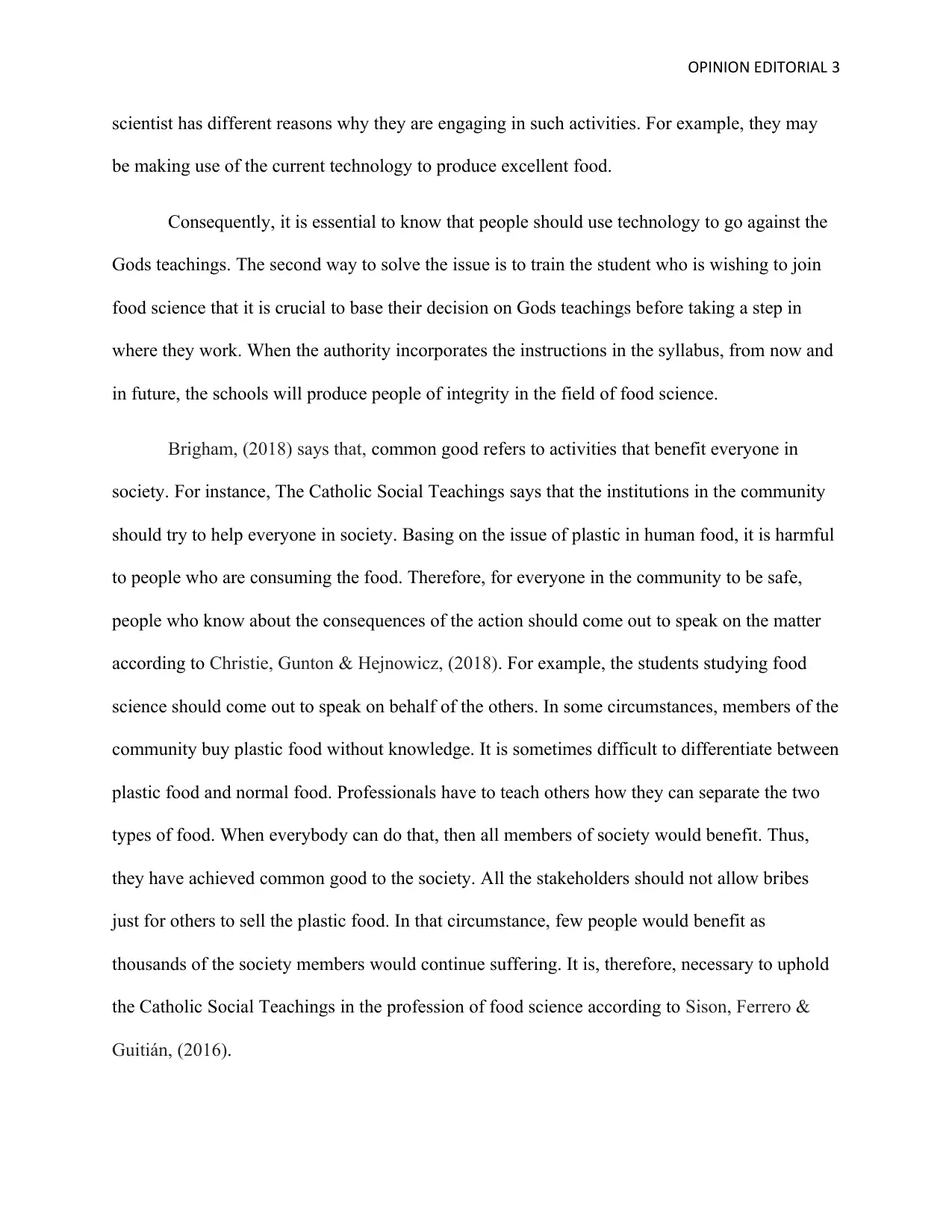
OPINION EDITORIAL 3
scientist has different reasons why they are engaging in such activities. For example, they may
be making use of the current technology to produce excellent food.
Consequently, it is essential to know that people should use technology to go against the
Gods teachings. The second way to solve the issue is to train the student who is wishing to join
food science that it is crucial to base their decision on Gods teachings before taking a step in
where they work. When the authority incorporates the instructions in the syllabus, from now and
in future, the schools will produce people of integrity in the field of food science.
Brigham, (2018) says that, common good refers to activities that benefit everyone in
society. For instance, The Catholic Social Teachings says that the institutions in the community
should try to help everyone in society. Basing on the issue of plastic in human food, it is harmful
to people who are consuming the food. Therefore, for everyone in the community to be safe,
people who know about the consequences of the action should come out to speak on the matter
according to Christie, Gunton & Hejnowicz, (2018). For example, the students studying food
science should come out to speak on behalf of the others. In some circumstances, members of the
community buy plastic food without knowledge. It is sometimes difficult to differentiate between
plastic food and normal food. Professionals have to teach others how they can separate the two
types of food. When everybody can do that, then all members of society would benefit. Thus,
they have achieved common good to the society. All the stakeholders should not allow bribes
just for others to sell the plastic food. In that circumstance, few people would benefit as
thousands of the society members would continue suffering. It is, therefore, necessary to uphold
the Catholic Social Teachings in the profession of food science according to Sison, Ferrero &
Guitián, (2016).
scientist has different reasons why they are engaging in such activities. For example, they may
be making use of the current technology to produce excellent food.
Consequently, it is essential to know that people should use technology to go against the
Gods teachings. The second way to solve the issue is to train the student who is wishing to join
food science that it is crucial to base their decision on Gods teachings before taking a step in
where they work. When the authority incorporates the instructions in the syllabus, from now and
in future, the schools will produce people of integrity in the field of food science.
Brigham, (2018) says that, common good refers to activities that benefit everyone in
society. For instance, The Catholic Social Teachings says that the institutions in the community
should try to help everyone in society. Basing on the issue of plastic in human food, it is harmful
to people who are consuming the food. Therefore, for everyone in the community to be safe,
people who know about the consequences of the action should come out to speak on the matter
according to Christie, Gunton & Hejnowicz, (2018). For example, the students studying food
science should come out to speak on behalf of the others. In some circumstances, members of the
community buy plastic food without knowledge. It is sometimes difficult to differentiate between
plastic food and normal food. Professionals have to teach others how they can separate the two
types of food. When everybody can do that, then all members of society would benefit. Thus,
they have achieved common good to the society. All the stakeholders should not allow bribes
just for others to sell the plastic food. In that circumstance, few people would benefit as
thousands of the society members would continue suffering. It is, therefore, necessary to uphold
the Catholic Social Teachings in the profession of food science according to Sison, Ferrero &
Guitián, (2016).
⊘ This is a preview!⊘
Do you want full access?
Subscribe today to unlock all pages.

Trusted by 1+ million students worldwide
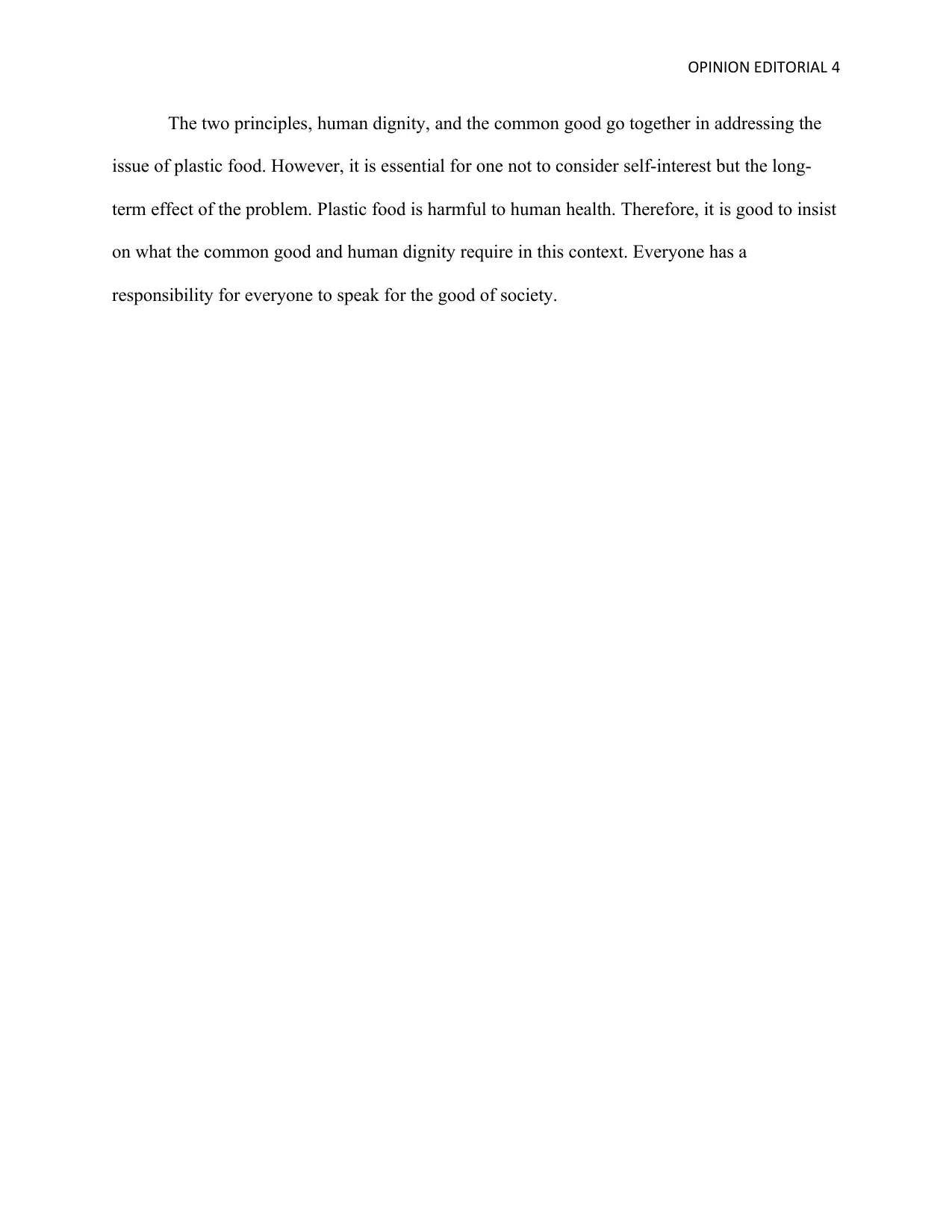
OPINION EDITORIAL 4
The two principles, human dignity, and the common good go together in addressing the
issue of plastic food. However, it is essential for one not to consider self-interest but the long-
term effect of the problem. Plastic food is harmful to human health. Therefore, it is good to insist
on what the common good and human dignity require in this context. Everyone has a
responsibility for everyone to speak for the good of society.
The two principles, human dignity, and the common good go together in addressing the
issue of plastic food. However, it is essential for one not to consider self-interest but the long-
term effect of the problem. Plastic food is harmful to human health. Therefore, it is good to insist
on what the common good and human dignity require in this context. Everyone has a
responsibility for everyone to speak for the good of society.
Paraphrase This Document
Need a fresh take? Get an instant paraphrase of this document with our AI Paraphraser
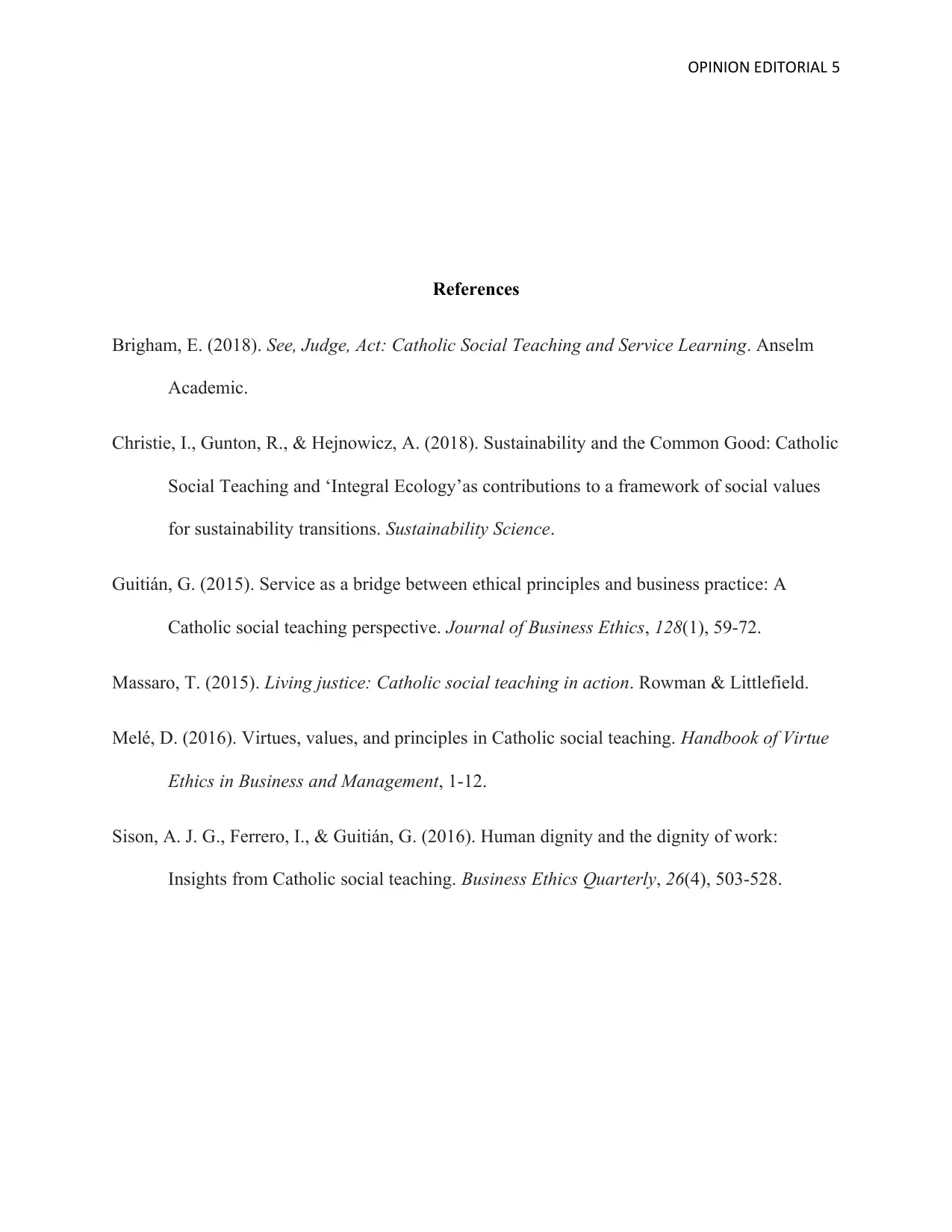
OPINION EDITORIAL 5
References
Brigham, E. (2018). See, Judge, Act: Catholic Social Teaching and Service Learning. Anselm
Academic.
Christie, I., Gunton, R., & Hejnowicz, A. (2018). Sustainability and the Common Good: Catholic
Social Teaching and ‘Integral Ecology’as contributions to a framework of social values
for sustainability transitions. Sustainability Science.
Guitián, G. (2015). Service as a bridge between ethical principles and business practice: A
Catholic social teaching perspective. Journal of Business Ethics, 128(1), 59-72.
Massaro, T. (2015). Living justice: Catholic social teaching in action. Rowman & Littlefield.
Melé, D. (2016). Virtues, values, and principles in Catholic social teaching. Handbook of Virtue
Ethics in Business and Management, 1-12.
Sison, A. J. G., Ferrero, I., & Guitián, G. (2016). Human dignity and the dignity of work:
Insights from Catholic social teaching. Business Ethics Quarterly, 26(4), 503-528.
References
Brigham, E. (2018). See, Judge, Act: Catholic Social Teaching and Service Learning. Anselm
Academic.
Christie, I., Gunton, R., & Hejnowicz, A. (2018). Sustainability and the Common Good: Catholic
Social Teaching and ‘Integral Ecology’as contributions to a framework of social values
for sustainability transitions. Sustainability Science.
Guitián, G. (2015). Service as a bridge between ethical principles and business practice: A
Catholic social teaching perspective. Journal of Business Ethics, 128(1), 59-72.
Massaro, T. (2015). Living justice: Catholic social teaching in action. Rowman & Littlefield.
Melé, D. (2016). Virtues, values, and principles in Catholic social teaching. Handbook of Virtue
Ethics in Business and Management, 1-12.
Sison, A. J. G., Ferrero, I., & Guitián, G. (2016). Human dignity and the dignity of work:
Insights from Catholic social teaching. Business Ethics Quarterly, 26(4), 503-528.
1 out of 5
Related Documents
Your All-in-One AI-Powered Toolkit for Academic Success.
+13062052269
info@desklib.com
Available 24*7 on WhatsApp / Email
![[object Object]](/_next/static/media/star-bottom.7253800d.svg)
Unlock your academic potential
Copyright © 2020–2026 A2Z Services. All Rights Reserved. Developed and managed by ZUCOL.





